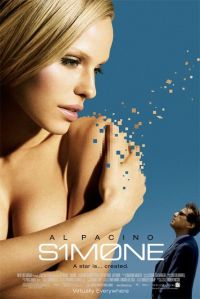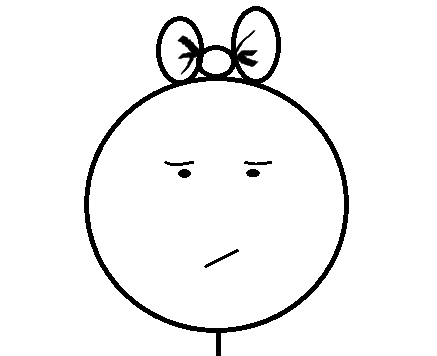
Computers are Magic !
I usually enjoy a bad movie, but 2002’s Simone is bad in a way that makes me uncomfortable.
In it, struggling director Victor Taransky (Al Pacino) has his latest project scrapped by the studio after his leading lady walks off the set due to creative differences. Luckily, a few minutes pass and Elias Koteas appears. (One of the most satisfying sentences I’ve typed all year).
Koteas’ character, Hank, is a terminally ill, tech genius who has the solution to Victor’s problems; a lifelike, virtual-actress which he has designed on his home PC.
I guess he got bored with Minesweeper.
Anyway, Hank’s creation will allow Victor to both finish his film and pack it chock-full of unnecessary nudity. Yay!
Unfortunately, rather than explaining this to Victor as clearly and concisely as I just did, the screenplay demands Hank be all vague and pronoun-y instead. This leads Victor to dismiss Hank as a kook and allows the screenwriter to check off the “Hero does not heed the call” box on his Christopher Vogler storytelling checklist before grabbing a beer and calling it a night.

Days, weeks or possibly months go by (it’s really hard to tell), Hank dies (off-screen) and a hard drive containing the computer simulation is delivered to Victor and, with no more tech knowledge than your average great-grandparent, he is then able to seamlessly edit Simone into his movie using Microsoft Paint or something.
The movie premieres to a handful of studio bigwigs who take one look at Simone and promptly lose their minds. Quicker than you can say “who dat?” Hollywood is abuzz with talk of Simone:
Who is she?
Where did she come from?
And where can I see an unflattering photograph of her eating a burrito?
Scared to reveal that Simone is nothing more than a shapely collection of zeroes and ones, Victor continues his charade, becoming a go-between for the studio and the extremely ‘publicity shy’ actress. Simone’s perceived rejection of the trappings of fame frustrate both the studio head, who also happens to be Victor’s ex-wife, (I smell a reconciliation!) and the press (all two of them), who become determined to track her down, paw through her garbage and erroneously refer to a little weight her mid-section as a ‘baby bump’.
Meanwhile, Victor rides high. The studio greenlights his next “Simone picture”, his relationship with his ex-wife seems to improve (told you) and even the actress who walked out on him, comes back, tail between her legs and ready to make out.

Victor should be happy but, instead he becomes quickly and inexplicably resentful of Simone and wants rid of her. But there’s a problem, if he comes clean about his deceit, will anyone ever hire him again?
I mean…yeah, probably.
He’s heard of Roman Polanski, right?
The most frustrating thing about this film is that there are so many interesting ideas in it and numerous possibilities for how they could play out.
For instance, when the only two paparazzi in LA raid what they believe to be Simone’s hotel room and find nothing incriminating, one quips that her past must be “…dark. It has to be dark.” That’s a potentially fascinating take on the media’s habit of creating their own narratives for celebrities who decline to share personal information with them.
Unfortunately, it goes nowhere and therein lies the problem with the whole film. It’s a great premise but nothing is fleshed out, least of all the characters.
Victor Taransky could have been a chauvinist director who learns exactly what an actress has to go through to keep getting hired when he creates his own. He could have been shown constantly modifying Simone to keep up with studio and public demand only to then have her face a Renee Zellweger- style backlash about her perceived “nips” and “tucks”.
Instead, he’s basically Victor Frankenstein, genius creator who will ultimately be destroyed by his greatest creation, as Hank’s death (and the fact the main character is called Victor) so helpfully foreshadowed.
More problematic though, is Simone.
We are constantly told by characters that Simone is amazing but we never see it. She’s slick and perfect looking but in the few brief flashes we see her act…she’s terrible.
We never see or understand why people so entranced by her?
Nor do we find out why, at her concert, they stare at her with beatific looks on their faces, hands raised to the heavens, longing to lay their hands on the hem of her sequined garment.
Oh, I’m sorry, did I neglect to mention that Simone becomes a popstar?
Yeah, Mr. Doesn’t-know-how-to-send-an-email manages to create Simone in ultra-realistic hologram form and stages a concert that is then simulcast around the world.

The movie is chock full of similarly baffling choices and unanswered questions, like:
Where the hell are the other people who are making these movies with Victor?
Where is his cinematographer, his producer, his crew, his goddamn assistants?
Are we supposed to believe he does all of this himself like ‘Birdemic’ auteur James Nguyen? Forcing his actors to hold boom mics between their knees while he films their scenes on a Sony Handycam.
Furthermore, where did Victor get that specially designed keyboard he uses to control Simone? Hank only left him a hard drive.
And, why does he need an entire studio soundstage to store a PC and three monitors?
And what studio just lets a director have a sound studio on a lot when he’s not shooting? Don’t they need those for, like, other films?
Furthermore, who greenlit a scene where, in lieu of appearing at the Oscars in person, Simone’s seat is filled with an enlarged photograph of her? When, in the history of the Oscars, has that ever happened?
Al Pacino has an Oscar, and I’m pretty sure he’s been to the ceremony a few times. Why not ask him how it works if you’re not sure?
Finally, why has no one turned that clip of Al Pacino smearing lipstick all over his mouth into a hilarious GIF yet?
I think what makes me so uncomfortable about this movie is that it seems so in love with its central premise it treats its audience like dumb-dumbs; assuming they’ll be too wrapped up in their popcorn and the movie’s fantastic premise to worry about paper thin characters and gaping plot holes.
So, one of the biggest questions I have about this film is how did writer, producer, director, Andrew Niccol screenwriter of The Truman Show, a movie that explores similar themes through a similarly strong idea but goes to the trouble of creating characters, stakes and scenes that advance the story, avoid doing any of that here?
Did Niccol get so swept up in his central idea that he never bothered to flesh it out properly?
Was he wearing too many hats during production to be able to look at his movie objectively?
Did the studio interfere with the final cut?
Does the collaborative and corporatized nature of film making mean that, often, a movie can be spoiled by too many cooks?
Or, am I reading too much into this?
